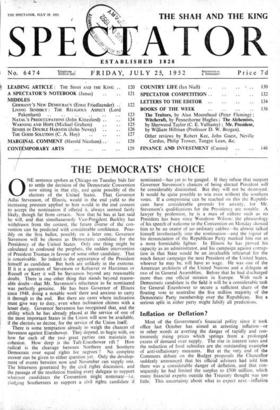THE DEMOCRATS' CHOICE
0 NE sentence spoken at Chicago on Tuesday bids fair to settle the decision of the Democratic Convention now sitting in that city, and quite possibly of the electors of the United States. That Governor Adlai Stevenson, of Illinois, would in the end yield to the increasing pressure applied to him would in the end consent to accept the nomination if offered it, always seemed fairly likely, though far from certain. Now that he has at last said he will, and that simultaneously Vice-Prelident Barkley has withdrawn from the contest, the future course- of the con- vention can be predicted with considerable confidence. Poss- ibly on the first ballot, possibly on a later one, Governor Stevenson will be chosen as Democratic candidate for the Presidency of the United States. Only one thing might be calculated to confound the prophets, the sudden intervention of President Truman in favour of some other candidate. That is conceivable. So indeed is the appearance of the President himself as candidate. But both are unlikely in the extreme. If it is a question of Stevenson or Kefauver or Harriman. or Russell or Kerr it will be Stevenson beyond any reasonable doubt. There is one other thing that stands beyond reason- able doubt—that Mr. Stevenson's reluctance to be nominated was perfectly genuine. He has been Governor of Illinois since 1948, doing a notable work' there and anxious to carry it through to the end. But there are cases where inclination must give way to duty, even when inclination chimes with a lesser duty. Governor Stevenson has recognised that, and the ability which he has already placed at the service of one of the most important States in the Union will now be available, if the electors so decree, for the service of the Union itself. There is some temptation already to weigh the chances of Stevenson against Eisenhower. They depend, to begin with, on how far each of the two great parties can maintain its cohesion. How deep is the Taft-Eisenhower rift ? How radical is the cleavage between Northern and Southern Democrats over equal rights for negroes ? No complete answer can be given to either question yet. Only the develop- ment 'of events between now and November can supply one. The bitterness generated by the civil rights discussion, and the passage of the resolution binding every delegate to support whatever candidates the Convention might nominate—i.e. pledging Southerners to support- a civil rights candidate if nominated—has yet to be gauged. If they refuse that support Governor Stevenson's chances of being elected President will be considerably diminished. But they will not be destroyed. It would be quite possible to win even without the southern votes. If a compromise can be reached on this the Republi- cans have considerable grounds for anxiety, for Mr. Stevenson's qualifications for the Presidency are notable. A lawyer by profession, he is a man of culture such as no President has been since Woodrow Wilson; the phraseology of his speech of welcome to the Convention on Monday showed him to be an orator of no ordinary calibre—he almost talked himself involuntarily into the nomination—and the vigour of his denunciation of the Republican Party marked him out as a most formidable fighter. In Illinois he has proved his capacity as an administrator, and his campaign against corrup- tion in that State would be an invaluable rehearsal for the much fiercer campaign the next President of the United States, whoever he may be, will have to wage. He was one of the American architects of the United Nations and a delegate at two of its-General Assemblies. Before that he had discharged more than one official mission in Europe. With such a Democratic candidate in the field it will be a considerable task for General Eisenhower to secure a sufficient share of the floating vote to neutralise the five million majority of the Democratic Party membership over the Republican. But a serious split in either party might falsify all predictions.


































